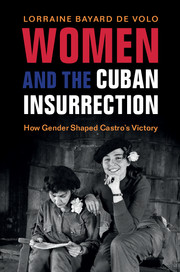Book contents
- Women and the Cuban Insurrection
- Women and the Cuban Insurrection
- Copyright page
- Dedication
- Contents
- Preface
- 1 Revolution Retold
- 2 “How Can Men Tire When Women Are Tireless?”
- 3 A Movement Is Born
- 4 Abeyance and Resurgence
- 5 Gendered Rebels
- 6 War Stories Celebrated and Silenced
- 7 “Stop the Murders of Our Children”
- 8 Masculinity and the Guerrilla War of Ideas
- 9 Women Noncombatants
- 10 Las Marianas
- 11 Past Is Prologue
- Bibliography
- Index
Preface
Published online by Cambridge University Press: 19 January 2018
- Women and the Cuban Insurrection
- Women and the Cuban Insurrection
- Copyright page
- Dedication
- Contents
- Preface
- 1 Revolution Retold
- 2 “How Can Men Tire When Women Are Tireless?”
- 3 A Movement Is Born
- 4 Abeyance and Resurgence
- 5 Gendered Rebels
- 6 War Stories Celebrated and Silenced
- 7 “Stop the Murders of Our Children”
- 8 Masculinity and the Guerrilla War of Ideas
- 9 Women Noncombatants
- 10 Las Marianas
- 11 Past Is Prologue
- Bibliography
- Index
Summary
Having lived in Nicaragua at the end of the Contra War and immediate postwar period, I am mindful of both the trauma that war inflicts and the fact that a full reckoning with the physical and psychological trauma of the Cuban insurrection, including the collateral damage inflicted by all sides, is missing from this book. The wounds of war were terribly fresh during my Nicaragua fieldwork in the late 1980s and early 1990s, and interviewing war victims, I was immersed in the details. One day, while we walked the steep path to her house, María told me how, as a teenager, she faced a terrible choice when the Somoza regime's National Guard attacked her village: which of her two children to grab as she fled. She left her newborn infant and fled with her two-year-old. To survive, she joined the guerrilla and carried her son on her back, along with a gun, through the mountains until he too died. Wars, even those waged by leftist rebels in the name of liberation, are reliably traumatic and brutal. Armed rebellion, by definition, entails killing. Suspected traitors are executed after summary judgments. “Collateral damage” is endemic, and people are killed in crossfire, sometimes by guerrilla bullets (errant or otherwise) or botched homemade bombs. The military murders villagers suspected of sharing food with guerrillas. Guerrillas fire on teenage military conscripts.
It is difficult to reconcile the gains to gender equality implied by women engaging in one of the most masculine of pursuits – war – with feminist anti-militarism's insistence that scholarship must “recognize the sheer corporeality of the terrain” upon which attacks and ambushes are laid by rebels and regime alike. Without such recognition, research is complicit in the process of rendering invisible the suffering of war victims, leaving them as disembodied statistics if they are counted at all. The corporeality of war does not render irrelevant women rebels' achievements, but it prompts the “sturdy suspicion of war” called for by feminist anti-militarism. In the literature on the Cuban insurrection, including that on women rebels, with few exceptions the bloody reality of war and its long-term psychological costs are remote if not invisible.
- Type
- Chapter
- Information
- Women and the Cuban InsurrectionHow Gender Shaped Castro's Victory, pp. ix - xiiPublisher: Cambridge University PressPrint publication year: 2018



